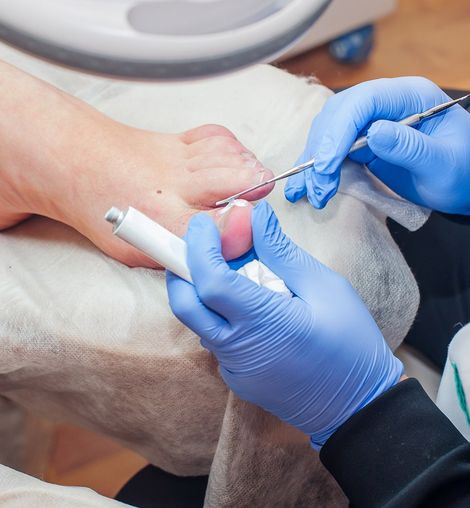Non-Invasive Correction
We see many patients that are plagued with pain that keeps them from being able to enjoy life or be comfortable during normal daily activities. While there may be surgical treatments available, there are a wide array of issues that can still be treated successfully without more invasive, surgical procedures. Ranging from custom orthotic inserts to pain management therapies, Dr. Peteros works with patients to create a personalized treatment plan to alleviate symptoms of many common foot and ankle disorders including:
Fungal Nail Infections
Fungal nail infections cause discomfort, pain, and embarrassment, thus decreasing the quality of your life. Without treatment, the infection can get worse for the nail and surrounding skin. Early treatment, on the other hand, shortens the treatment length, and increases your chances of finding a permanent cure.
Sprains and Strains
Unless severe damage has been done to the foot or ankle, most sprains can be non-surgically treated with proper stabilization and timely treatment. Icing, compressing, and elevating the injured area can help to speed up recovery time. Painful sprains can often be managed with over the counter pain relievers.
Flat Feet
While patients with flat feet may never experience any physical symptoms, there are those that will suffer from foot pain, particularly in the heel or arch area of the foot. There are a variety of treatments that can be tried to resolve symptoms of flat feet, including anti-inflammatories, physical therapy, stretching exercises, or digital custom orthotic inserts. Dr. Peteros will evaluate the severity of your fallen arch to provide a customized treatment plan.
Athlete's Foot
Caused by a fungus, athlete's foot can lead to uncomfortable itching, burning, blisters, and more. There are a variety of over the counter medications available, but what do you do if you do not find relief? Dr. Peteros will conduct an exam to confirm if a fungus is the true cause of your symptoms. If it is confirmed, we will set up a treatment plan of anti-fungal medication. Occasionally, a bacterial infection may be the culprit, in which case we will prescribe a regimen of antibiotics to clear up the infection.

